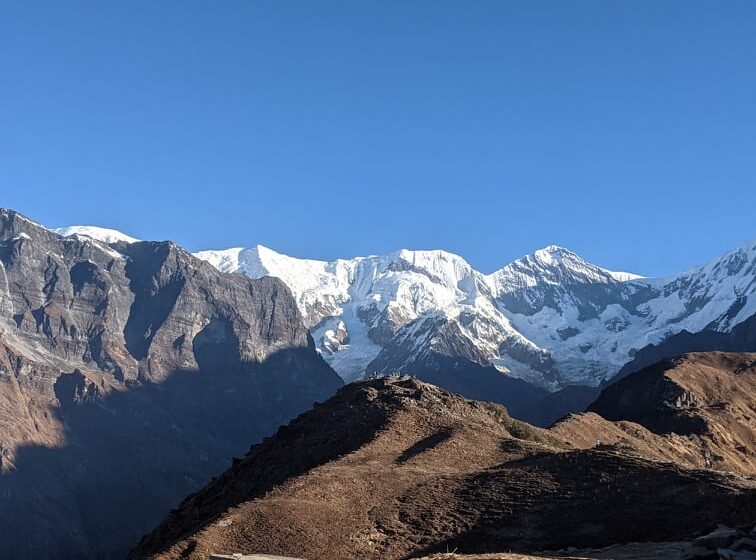
Mardi, Money and Manpari

Tucked under the Himalayas, sits a relatively unknown trekking route. Bored with the hustle and bustle of the city, yet unable to take extended holidays from work, Mardi Himal trek provides the perfect opportunity to recharge yourself in less than 4 days. Depending on your schedule and physical limit, you can complete the trek and bask yourself in the mesmerizing sight of the Himalayan range. Not surprisingly, the trek is fast becoming a popular go-to destination, especially for young people looking for a quick escape. That said, Mardi trekking route has also increasingly come under scrutiny for becoming one of the most expensive and unprofessional trekking routes in Nepal. In this article, I will be highlighting some of the pertinent issues that I personally experienced along with others’ personal anecdotes. Additionally, it will also attempt to provide relevant suggestions to the concerned authorities.
Exorbitant cost
As a seasoned trekker, I was shocked to find out the exorbitant cost that the tea shops and lodges charge their customers. One of the main excuses for the hefty price tag is that they have to rely on human or mule labor to carry the goods. While this is true, it is in fact tragic that the laborers who actually do the heavy lifting get paid peanuts compared to the margin these shops levy on customers. For instance, a laborer gets paid roughly around Rs 500-1000 to carry goods weighing over 50 kilos. While the shops make more than 200-300 percent profit on these items, which will amount to tens of thousands, citing labor cost, the labor barely gets paid anything. Moreover, the pricing still is not justified compared to other trekking routes that are situated at higher altitudes. Imagine a 20 year old kid having to pay Rs 400 for 2 cups of black tea at a meagre elevation of 3000 meters. RIDICULOUS!

Politics
While access to unions and decentralization can be generally helpful to help protect the rights of citizens, Mardi serves as a cautionary tale of how such ‘committees’ can end up becoming a sort of its own mafia racket. One hotel owner, who does not wish to be identified fearing repercussions, stated that the committee bribed more than 20 people from the forest department recently to maintain their illegally built property. The lodges and tea shops in the area are all built on encroached forest land that belongs to the Nepal government. This means that these lodges do not pay any property tax or income tax. Why would they? Officially, for the Nepal government, they do not EXIST! A foreigner pays around Rs.5000 as a permit fee to enter the area. Except for that, every single penny they, along with Nepalese tourists, pay goes into the coffers of committee members who operate these hotels and tea shops.
Moreover, these ‘committees’ have the penchant for running more like mafia. Just recently, a group of young Nepalese trekkers were harassed by the owner of Hotel Machhapuchhre Samjhana for having the ‘audacity’ to refuse a service, which tried to force 8 people in a room that barely accommodates 2 people. Sharing the experience with a popular Facebook page ‘ Dari gang’, Prachanda Jung Chhetri, recounted his harrowing experience. They were forced to pay more than Rs 10,000 in addition to the harassments. Coincidentally, I happened to be in the same area when the incident was posted and while talking to hotel owners, it seemed clear, they did not care. From their perspective, ‘young boys’ are loud and difficult. The price for food and lodging is haphazardly set by the committee, and like a typical Mafia mob, they do not allow hotels operating at certain areas to provide lodging and proper food services. For example, the committee does not allow hotels to provide lodging beyond High camp. This means that tourists wanting to see the sunrise from a vantage point called ‘Viewpoint’ are forced to begin their trek at 4 am without any food in the blistering cold.

While Nepal keeps declaring ‘Visit Nepal’ campaigns with big aspirations, the fact that it does not care about the illegal encroachment of its land and forests; about the services and rights of the tourists proves that much has to be done at the grassroots level. With a fast growing middle/ upper middle class, Nepal is bound to see a boom in internal tourism. With incidents like the ones mentioned above, Mardi route as a brand is bound to suffer. Internal tourism can be a great source of revenue generation and job creation. However, the government should take proactive steps in making sure that the lodges and hotels operate under a legal ambit. Moreover, they need to ensure that these shops and hotels leave minimal environmental impact.
As of writing this, it is unclear how ACAP handles cutting down trees. Basically, every hotel and shop has a heating system that needs wood as fuel. It is unclear what authorities are doing to ensure prohibition of unnecessary deforestation from hotels that do not EXIST! Moreover, the government needs to ensure that they have a proper department where customers can officially complain. A tourist who saves up some money to go on a few days trip certainly does not have the time to go back to the respective ward to file a complaint. In addition, when the one harassing ends up becoming the chairman of the committee, a committee that has bought the silence of ACAP and forest department, what else can we expect than a flustered trekker on social media? However, the fact that this issue got viral shows that in spite of the mafia-like behavior of the hotel owners, exorbitant cost, and silence from the government, brand value of the place has certainly taken a nosedive. As a relatively new trekking circuit, Mardi holds huge potential but the government needs to regulate these hotel owners and ‘committees’ who have so far, unfortunately, been treating the entire Mardi route as their private backyard!




